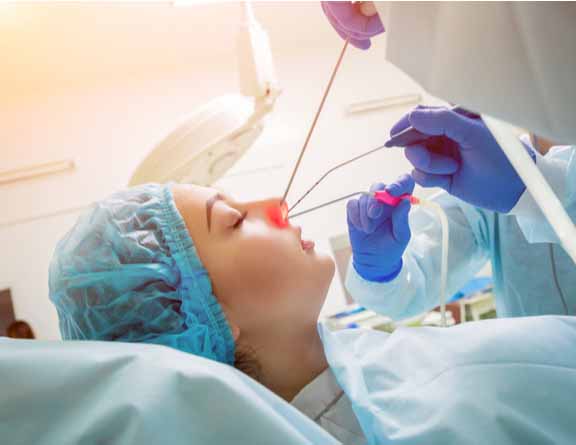
Alleppey
USFDA Approved Procedures
Minimally invasive. Minimal pain*.
Insurance Paperwork Support
1 Day Procedure


Treatment
If you’re looking for the best sinusitis treatment in Alleppey, Pristyn Care offers advanced solutions. They focus on using effective methods to help you breathe easier and feel better.
Functional endoscopic sinus surgery (FESS) is a minimally invasive procedure used to treat chronic sinusitis or other sinus-related issues that don’t respond to medications. This surgery typically lasts between 1 to 2 hours and is performed under general anaesthesia to ensure the patient’s comfort throughout the procedure.
FESS uses an endoscope, a small camera inserted through the nose, allowing the surgeon to view and clear blockages or repair damaged sinus passages. The procedure aims to restore normal sinus drainage and improve airflow, alleviating symptoms like congestion, pain, and pressure.
After the surgery, most patients require only a 1-day hospital stay for observation and recovery. FESS is a highly effective option for patients with persistent sinus problems who have not found relief from conservative treatments. While recovery times vary, many patients experience significant improvement in their symptoms within weeks after surgery.
Best ENT Clinics For Functional Endoscopic Sinus Surgery
At Pristyn Care, you can avail advanced sinus surgery with a microdebrider for better results and quicker recovery with low chances of recurrence.
At Pristyn Care, we have ENT surgeons with 8-10 years of experience in performing advanced FESS surgery with successful results.
FESS surgery at Pristyn Care has a success rate of over 95%, thanks to our advanced treatment facilities, expert surgeons, and state-of-the-art treatment centers.
At Pristyn Care, you can avail pre and postoperative consultations along with diagnostic endoscopy for diagnostic confirmation and treatment planning. You will also receive follow-up checkups with your ENT surgeon after surgery.
Sinusitis is when the sinuses, which are air-filled spaces in your face, become inflamed and swollen. This can lead to feelings of congestion and discomfort.
If you have sinusitis, you might experience a range of symptoms such as pain in your face, a blocked nose, thick nasal discharge, and sometimes even a reduced ability to smell things.
To treat acute sinusitis, doctors often prescribe antibiotics to fight infection, decongestants to reduce swelling in your nasal passages, and saline sprays to keep your nose moist.
Surgery might be necessary if there are physical problems like a deviated septum (the wall between your nostrils being off-centre) or if there are growths called polyps blocking the sinuses.
There are a few types of surgeries for sinus issues. Two common ones are FESS (functional endoscopic sinus surgery), which uses a tiny camera, and balloon sinuplasty, which involves inserting and inflating a small balloon to open up blocked sinuses.
When non-surgical methods don’t do the trick, sinus infection treatment in Alleppey may involve surgery. Here’s how it usually unfolds:
Preparation is key to ensuring a smooth sinusitis treatment process:
After your sinusitis treatment in Alleppey, here’s what you should expect and do:
.svg)
.svg)